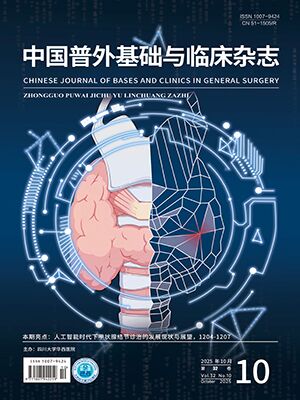| 1. |
Pranavchand R, Reddy BM.Current status of understanding of the genetic etiology of coronary heart disease[J].J Postgrad Med, 2013, 59(1):30-41.
|
| 2. |
Llau JV, Ferrandis R, Castillo J, et al.Recommendations on use of direct oral anticoagulants in the perioperative period[J].Med Clin (Barc), 2012, 139 Suppl 2:46-50.
|
| 3. |
唐健雄, 华蕾, 张逖, 等.成人腹股沟疝患病情况的多中心研究[J].外科理论与实践, 2002, 7(6):421-423.
|
| 4. |
Pierides G, Mattila K, Vironen J.Quality of life change in elderly patients undergoing open inguinal hernia repair[J].Hernia, 2013, 17(6):729-736.
|
| 5. |
张繁疆, 曾环洪, 蓝锦文, 等.前入路腹膜前间隙无张力疝修补术治疗成人腹股沟疝32例临床分析[J/CD].中华疝和腹壁外科杂志:电子版, 2011, 5(3):320-324.
|
| 6. |
Lichtenstein IL, Shulman AG, Amid PK, et al.The tension-free hernioplasty[J].Am J Surg, 1989, 157(2):188-193.
|
| 7. |
陈大伟, 史华俊, 刘开全, 等.引流在腹股沟无张力疝修补术中的应用[J/CD].中华疝和腹壁外科杂志:电子版, 2010, 4(1):40-43.
|
| 8. |
蔡昭, 唐健雄, 黄磊, 等.经腹股沟切口单纯腹膜前修补腹股沟疝的治疗体会[J].外科理论与实践, 2008, 13(6):531-533.
|
| 9. |
靳根峰, 冯建超, 刘勇, 等.腹腔镜与无张力疝修补治疗复发性腹股沟疝对比分析[J/CD].中华疝和腹壁外科杂志:电子版, 2012, 6(4):61-63.
|
| 10. |
Krishna A, Misra MC, Bansal VK, et al.Laparoscopic inguinal hernia repair:transabdominal preperitoneal (TAPP) versus totally extraperitoneal (TEP) approach:a prospective randomized controlled trial.[J].Surg Endosc, 2012, 26(3):639-649.
|
| 11. |
谭慧芬.阿司匹林用于中老年抗血栓最佳剂量分析[J].中国老年学杂志, 2013, 33(10):2393-2394.
|
| 12. |
胡大一, 张鹤萍, 孙艺红, 等.华法林与阿司匹林预防非瓣膜性心房颤动患者血栓栓塞的随机对照研究[J].中华心血管病杂志, 2006, 34(4):295-298.
|
| 13. |
柴伟, 许猛, 张国强, 等.人工心脏瓣膜置换术后关节置换的围手术期抗凝治疗策略[J].中国骨与关节外科, 2013, 6(1):21-24.
|
| 14. |
王珏, 施万印.抗凝、抗血小板及溶栓药物的合理应用[J].介入放射学杂志, 2011, 20(1):76-81.
|
| 15. |
夏锡仪, 谭玉林, 孙亚伟, 等.低分子肝素预防外科术后患者的肺栓塞[J].中国危重病急救医学, 2011, 20(1):76-81.
|
| 16. |
Hirsh J, Warkentin TE, Shaughnessy SG, et al.Heparin and low-molecular-weight heparin:mechanisms of action, pharmacokinetics, dosing, monitoring, efficacy, and safety[J].Chest, 2001, 119(1 Suppl):64S-94S.
|
| 17. |
陈纪林, 郭远林.冠状动脉介入治疗中不同抗凝药物的疗效及安全性评述[J].中国循环杂志, 2011, 26(5):322-324.
|
| 18. |
Fuster V, Rydén LE, Cannom DS, et al.ACC/AHA/ESC 2006 guidelines for the management of patients with atrial fibrillation:a report of the American College of Cardiology/American Heart Association Task Force on Practice Guidelines and the European Society of Cardiology Committee for Practice Guidelines (Writing Committee to Revise the 2001 Guidelines for the Management of Patients With Atrial Fibrillation):developed in collaboration with the European Heart Rhythm Association and the Heart Rhythm Society[J].Circulation, 2006, 114(7):e257-e354.
|
| 19. |
Suzuki S, Yamashita T, Kato T, et al.Incidence of major bleeding complication of warfarin therapy in Japanese patients with atrial fibrillation[J].Circ J, 2007, 71(5):761-765.
|
| 20. |
孙艺红, 胡大一.华法林对中国人心房颤动患者抗栓的安全性和有效性研究[J].中华内科杂志, 2004, 43(4):258-260.
|
| 21. |
王宽, 王东, 郑柳颖, 等.观察ROC曲线用于评估非瓣膜心房颤动患者华法林抗凝出血风险[J].中国临床药理学杂志, 2013, 29(5):323-325.
|
| 22. |
霍保善, 张武, 胡旭东, 等.氯诺昔康复合芬太尼用于心血管手术后患者自控静脉镇痛的临床研究[J].中国医药指南, 2008, 6(15):4-6.
|
| 23. |
王莉, 冯艺, 杨拔贤, 等.开胸手术后患者肋间神经冷冻镇痛与硬膜外镇痛对凝血功能的影响[J].中华麻醉学杂志, 2005, 25(10):725-728.
|




